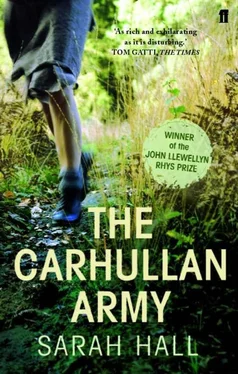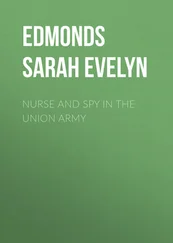Sarah Hall - The Carhullan Army
Здесь есть возможность читать онлайн «Sarah Hall - The Carhullan Army» весь текст электронной книги совершенно бесплатно (целиком полную версию без сокращений). В некоторых случаях можно слушать аудио, скачать через торрент в формате fb2 и присутствует краткое содержание. Год выпуска: 2008, Издательство: Faber and Faber, Жанр: Современная проза, на английском языке. Описание произведения, (предисловие) а так же отзывы посетителей доступны на портале библиотеки ЛибКат.
- Название:The Carhullan Army
- Автор:
- Издательство:Faber and Faber
- Жанр:
- Год:2008
- ISBN:нет данных
- Рейтинг книги:4 / 5. Голосов: 1
-
Избранное:Добавить в избранное
- Отзывы:
-
Ваша оценка:
- 80
- 1
- 2
- 3
- 4
- 5
The Carhullan Army: краткое содержание, описание и аннотация
Предлагаем к чтению аннотацию, описание, краткое содержание или предисловие (зависит от того, что написал сам автор книги «The Carhullan Army»). Если вы не нашли необходимую информацию о книге — напишите в комментариях, мы постараемся отыскать её.
The Carhullan Army — читать онлайн бесплатно полную книгу (весь текст) целиком
Ниже представлен текст книги, разбитый по страницам. Система сохранения места последней прочитанной страницы, позволяет с удобством читать онлайн бесплатно книгу «The Carhullan Army», без необходимости каждый раз заново искать на чём Вы остановились. Поставьте закладку, и сможете в любой момент перейти на страницу, на которой закончили чтение.
Интервал:
Закладка:
On the end of each row of terraces were the silhouettes of meters, small buzzing cysts that had been designed to read the flow of energy from photovoltaic tiles. Now, they were being used to regulate consumption from the old domestic power grid. There had been few improvements made after Reorganisation. The ten-year recovery plan was becoming a hopeless myth. It was hard not to look behind me, back the way I had come, to see if there was anyone there, following, or just watching me go. I made myself not turn round. I told myself the best way for me to keep going was to give my eyes one simple option — forward.
There was a soft crackle in the sky and the drag of thunder to the west. I knew it would rain sometime soon, that I’d have to stop and put on my waterproofs. But I could not afford to pause while I was still inside the perimeter. Maybe later, when I was clear of the place and warm from the walk, I would strip down. I knew that I would dry more quickly than my clothing.
For years I had not been out of Rith. No civilian had, unless they were being transported to a detention centre. The zones did not allow for transference. The original register bound people to their areas at the time of the collapse. Only government agents and the Authority had any need to travel, or the means to do it, and then it was usually by train.
It was my hometown and I was familiar with the surroundings — the steep streets and welter of roofs, the Beacon Hill, and opposite, on a twin tor, the castle. I kept on, along the old motorway flyover. Beneath it were heaps of scrap and rubbish, and I could hear rustling animal sounds. Past the settlement border, in the lower areas, the roads had deteriorated. They were much worse than I had imagined. In their years of redundancy they had sagged and rucked. Whole sections had been pulled away by the floods. They felt loose underfoot, like scree. In places there were small craters full of rainwater; I stumbled into them, soaking my trousers up over my boots to the knee. I realised it was true what people said at the factory and in quarter meetings. Nothing was being repaired except the arterial routes used by the Authority.
To begin with I jogged where I could, concentrating hard so as not to trip or turn an ankle, and pacing myself for what would be a long hard day. After half an hour I reached the rise where the white tollhouse stood. Its windows were out and the roof had given at one of the gables. I remembered from a local history lesson that it had been burnt down twice by the Scots, then rebuilt. Now it was almost a ruin again. The owners must have long since moved into Rith, with all the other outer-lying residents.
Down the hill, a little further on, the old Yanwath traffic bridge was still intact. I had driven over it many times before the travel ban. The signal that had once controlled it was dead; the glass lights black with dirt and its post askew in its concrete bed. Where the road dipped down before rising to the bridge’s abutment, water pooled and eddied. There was debris afloat in it, mostly indistinguishable, perhaps lumps of render from the houses upstream. I forded it, walked to the middle of the span and peered over the parapet. Below, the river Eden was brown and swollen and slipping past with frightening speed. In the half-dark I saw the bright movement of its edges, the backwash of white caps and whirlpools. It had broken its banks in the rains, spilling into the ditches and gardens on either side. I could hear the lower branches creaking as the trees along its sides were stripped of leaves.
The cottages next to the bridge were window-deep in the current. There was a strong odour of wet mortar, fabric and silt. It was the familiar smell of flooded homes; the riverbed slurrying up house walls, rotting curtains and carpets. It was the smell I had woken to over a decade ago, when I had come downstairs to find my house full of litter and sewage.
I knew the road on the other side of the bridge led away through a small empty village, into the green abandoned wilds of what used to be national parkland — the place my father’s generation had called the Lake District.
*
By the time the vehicle appeared it was midday, and raining hard. At first I thought the noise was just water, moving heavily in the air or through underground channels beneath the road. Then I heard a shift of gears. I jumped up onto the verge and turned round, half-expecting to see the dark blue shape of a cruiser and ready to duck behind the wall. A white civilian van was coming towards me, making its way slowly along the derelict road. Its suspension looked loose and amplified, as if the body had been raised from the chassis somehow, and it rocked slackly over the ridges and potholes. The windows were filthy with dirt, seedpods, and leaves that had been shaken from the trees in the latest slew. Behind it was a waft of greasy brown exhaust. It passed me by, then slowed, and finally stopped. Nervous, I walked up to the driver’s door; the window squeaked down.
‘Where are you off to then, lass?’ The man had a red face like a daub of glass taken out of a furnace. His pale eyes ran over me. I was a mess. My hair was dripping, and the old white tank top I had on was sopping and clinging to my skin. I shrugged my shoulders forward and lifted my arms over my chest to cover up. He laughed. His teeth were rotten along their edges. Each tooth had a dull yellow plateau at its tip and around his gum line was a telltale seam of silver. ‘Well, a spot of hiking it looks like. Last of the Wainwrights, are you? Or maybe you want to be the first one up onto the tops again. Plant a flag. Things must be improving in town if that’s the case. Come on. Best you get in.’
I hesitated. I hadn’t wanted to get involved with anyone on the way, and I knew questions might mean trouble, but my shoulders and feet were aching and I did not pause for long. I walked around the back of the van to the passenger side, pulling the wet material off my chest and wringing it out. He leant over and opened the door for me, like my father always used to when he drove me to school. He’d put a dirty-looking rag on the seat to keep it dry. I lay my rucksack on the floor of the cabin and climbed in. ‘Good girl,’ he said. ‘Good timing this, isn’t it?’
He put the van into gear and pulled away. It felt strange.
I had not been in a car for years. I’d handed my keys and personal information in along with everyone else, and I’d forgotten what it was like to be in control of a vehicle, to be enclosed but free to go anywhere. Watching him dip the clutch and flick on the wiper blades felt like a dream or a lost memory. The smell in the cabin was strong, tart, like old clothes, vinegar mixed with urine, or maybe it was the unwashed smell of the man himself. But I didn’t complain or make a move to wind the passenger window down. I was glad just to be out of the rain.
The soles of my feet were already tender, though I had on two thick pairs of socks. I felt the prickle of pins and needles start up in the ends of them and I curled and flexed my toes. I had not expected a ride from anyone. I’d been practising walking for months when I wasn’t on my shift, aimlessly at first, as if to pass the time, and then with purpose, looping round Rith’s periphery, up the hill to the Beacon and back down again. There was no crime in that, just walking, though Andrew thought it stupid to risk the dogs that scavenged around town, rooting for food in the tips. They were filthy and distempered, he said, and I was asking to get bitten. Occasionally there were attacks, but none of them fatal. I had not been able to wear my bag on any of these occasions; it would have been too suspicious, and it was a shock to my body, the weight of it.
I’d made sure to eat well all week; two portions of rice instead of one, sardines for breakfast, even though it took the box of provisions low, and Andrew would suffer for it for the rest of the month. I was as fit and as fed as I could be. But turning circuits round the citadel in the dim morning and eating extra cans of fish was one thing; hauling out to the abandoned park with my possessions on my back was altogether another. I’d come about twelve miles and I was sore. The bag on my back had been pulling down hard and my spine felt compressed. Showers had been coming and going for hours, the hems of my clothes were damp and chafing. Every step took me further away from the town and out towards my own limits. The appearance of any vehicle was unlikely, almost miraculous, and I was thankful for it.
Читать дальшеИнтервал:
Закладка:
Похожие книги на «The Carhullan Army»
Представляем Вашему вниманию похожие книги на «The Carhullan Army» списком для выбора. Мы отобрали схожую по названию и смыслу литературу в надежде предоставить читателям больше вариантов отыскать новые, интересные, ещё непрочитанные произведения.
Обсуждение, отзывы о книге «The Carhullan Army» и просто собственные мнения читателей. Оставьте ваши комментарии, напишите, что Вы думаете о произведении, его смысле или главных героях. Укажите что конкретно понравилось, а что нет, и почему Вы так считаете.












